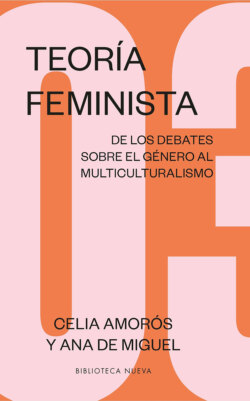Читать книгу Teoría feminista 03 - Celia Amorós - Страница 12
BIBLIOGRAFÍA
ОглавлениеAMORÓS, C., Hacia una crítica de la razón patriarcal, Barcelona, Anthropos, 1985.
— «Notas para una teoría nominalista del patriarcado», en Asparkía, núm. 1, Universitat Jaume I, Castellón, 1992.
— Tiempo de feminismo, Madrid, Cátedra, 1997.
— «Presentación (que intenta ser un esbozo del “status quaestionis”)», en C. Amorós (ed.), Feminismo y Filosofía, Madrid, Síntesis, 2000.
BELTRÁN, E. y MAQUIEIRA, V. (eds.), Feminismos. Debates teóricos contemporáneos, Madrid, Alianza, 2001.
BENHABIB, S., Situating the Self. Gender, Community and Postmodernism in Contemporary Ethics, Cambridge, Polity Press, 1992.
— «Fuentes de la identidad y el yo en la teoría feminista contemporánea», en Laguna, núm. 3, 1996, págs. 161 y sigs.
— «Sexual Difference and Collective Identities: The New Global Constellation», en Signs. Journal of Women in Culture and Society, vol. 24, núm. 2, 1999.
BENHABIB, S. y CORNELL, D., Teoría feminista y teoría crítica, Valencia, Alfóns el Magnànim, 1990.
BORDO, S., «Feminism, Post-modernism and Gender-Scepticism», en Nicholson (ed.), Feminism/Postmodernism, Nueva York-Londres, Routledge, 1989.
BRAIDOTTI, R., Nomadic Subjects. Embodiment and Sexual Difference in Contemporary Feminist Theory, Nueva York, Columbia University Press, 1994.
BUTLER, J., «Gender Trouble, Feminist Theory and Psychoanalytic Discourse», en L. J. Nicholson (ed.), Feminism/Postmodernism, Nueva York-Londres, Routledge, 1989. Hay traducción al castellano como Feminismo y Postmodernidad en Buenos Aires, Feminaria, 1995.
— Gender Trouble. Feminism and the Subversion of Identity, Londres, Routledge, 1999. Hay traducción al castellano: La disputa del género, México, Paidós-UNAM, 2001.
— «Sujetos de Sexo/Género/Deseo» en N. Carbonell y M. Torras (comps.), Feminismos literarios, Madrid, Arco Libros S.L., 1999.
COBO, R., «Género» en C. Amorós (dir.), Diez palabras claves sobre Mujer, Estella, Verbo Divino, 1995.
COBO, R., «Género y teoría social» en Revista Internacional de Sociología, núm. 25, enero-abril de 2000.
CORBETT, J. G., Gender, Cambridge, Cambridge University Press, 1991.
DELPHY, Ch., L’ennemi principale, II, Penser le genre, París, Éditions Syllepse, 2001.
DEMONTE, V., «Sobre la expresión lingüística de la diferencia», en C. Bernis (ed.), Los Estudios sobre la Mujer: de la investigación a la docencia, Madrid, Instituto Universitario de Estudios sobre la Mujer, 1991.
FEMENÍAS, M. L., Sobre sujeto y género. Lecturas feministas desde Beauvoir a Butler, Buenos Aires, Catálogos, 2000.
FRASER, N., Iustitia interrupta. Reflexiones críticas desde la posición «post-socialista», Sta. Fé de Bogotá, Ed. Siglos del Hombre, Universidad de los Andes, 1997.
HAWKESWORTH, M., «Confounding Gender», en Signs. Journal of Women in Culture and Society (22), 3, 1997, págs. 649-685.
DE LAURETIS, T., Technologies of Gender, Essays on Theory, Film and Fiction, Indiana University Press, 1987.
— «Feminist Studies/Critical Studies: Issues, Terms and Contexts», en T. De Lauretis (ed.), Feminist Studies/Critical Studies, Londres, The McMillan Press, 1988.
— Alicia ya no. Feminismo Semiótica y Cine, Madrid, Cátedra, 1992.
— Diferencias. Etapas de un camino a través del feminismo, Madrid, Horas y Horas, 2000.
MCNAY, L., Gender and Agency, Reconfiguring the Subject in Feminist and Social Theory, Polity Press, 2000.
HOOKS, B., Ain’t I a Woman?, Boston, South End Press, 1981.
MILLET, K., Política sexual, Madrid, Cátedra, 1995.
MOLINA, C., Dialéctica feminista de la Ilustración, Barcelona, Anthropos, 1993.
— «Debates sobre el género», en C. Amorós (ed.), Feminismo y Filosofía, Madrid, Síntesis, 2000.
NICHOLSON, L. J., Gender and History. The Limits of Social Theory in the Age of the Family, Nueva York, Columbia University Press, 1986.
NICHOLSON, L. J. (ed.), Feminism/Postmodernism, Nueva York-Londres, Routledge, 1991.
— The Second Wave, A Reader in Feminist Theory, Nueva York-Londres, Routledge, 1997.
PULEO, A. H., Dialéctica de la sexualidad. Género y sexo en la filosofía contemporánea, Madrid, Cátedra, 1992.
— Filosofía, género y pensamiento crítico, Valladolid, Secretariado de Publicaciones e Intercambio, Editorial de la Universidad de Valladolid, 2000.
RICH, A., Nacemos de mujer. La maternidad como experiencia e institución, Madrid, Cátedra, 1996.
RILEY, D., Am I that Name? Feminism and the Category of «Women» in History, Minneapolis, University of Minnesota, 1990.
RUBIN, G, «The Traffic in Women: Notes on the «Political Economy» of Sex », reproducido en L. Nicholson (comp.), The Second Wave, A Reader in Feminist Theory, Nueva York-Londres, Routledge, 1997.
— «Thinking Sex» en C. Vance (comp.), Pleasure and Danger. Exploring Female Sexuality, Routledge, 1984.
SCOTT, J. W., Gender and the Politics of History, Nueva York, Columbia University Press, 1984.
— «Comment on Hawkesworth’s «Confounding Gender», en la revista Signs. Journal of Women in Culture and Society (22), 3, 1997, págs. 697-702.
— «El género: una categoría útil para el análisis histórico», en M. Cangiano y L. DuBois (comps.), De mujer a género. Teoría interpretación y práctica feminista en las ciencias sociales, Centro Editor de América Latina, Buenos Aires, 1993.
— «La experiencia como prueba», en N. Carbonell y M. Torras (comps.), Feminismos literarios, Madrid, Arco Libros S. L., 1999.
SPIVAK, G. Ch., In Other Words. Essays in Cultural Politics, Nueva York, Methuen, 1986.
— The Post-Colonial Critic. Interviews, Strategies, Dialogues, Londres-Nueva York, Routledge, 1990.
